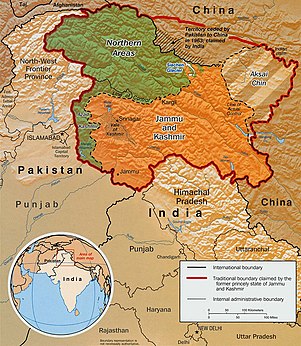Chumik Glacier
| Chumik Glacier | |
|---|---|
| Type | Mountain glacier |
| Location | Karakoram range, Gilgit-Baltistan, Pakistan |
| Coordinates | 35°13′1.2″N 76°54′32.4″E / 35.217000°N 76.909000°E |
| Length | 23 km (14 mi) |
 | |


Chumik Glacier is located in the Siachen region, in Pakistan. Located on the west of Saltoro ridge,[1] it is a 4-mile-long offshoot of the Bilafond Glacier.[2]
History
[edit]In military terminology, Chumik is a minor sub sector of Bilafond Sub Sector,[3] near Gyong La.
In March 1989, Indian Army launched the Operation Ibex to seize the Pakistani post overlooking the Chumik Glacier. The operation was unsuccessful at dislodging Pakistani troops from their positions. The Indian Army under Brig. R. K. Nanavatty then launched an artillery attack on Kauser Base, the Pakistani logistical node on Chumik Glacier. The destruction of Kauser Base induced Pakistani troops to vacate their Chumik posts just west of Gyong La, and Operation Ibex concluded.[4] Chumik Glacier to this day is under the control of Pakistani forces, the Pakistani forces are stationed on a post called "Sher Post" which is perched on a ridge at the head of the Chumik Glacier at 19,000 feet.[5]
See also
[edit]- Near the AGPL (Actual Ground Position Line)
- NJ9842, LoC ends and AGPL begins
- Gyong La
- Saltoro Mountains
- Saltoro Kangri
- Ghent Kangri
- Bilafond La
- Sia La
- Indira Col, AGPL ends at LAC
- Chumik Kangri
- Borders
- Actual Ground Position Line (AGPL)
- India–Pakistan International Border {IB)
- Line of Control {LoC)
- Line of Actual Control (LAC)
- Sir Creek (SC)
- Borders of China
- Borders of India
- Borders of Pakistan
- Conflicts
- Kashmir conflict
- Siachen conflict
- Sino-Indian conflict
- List of disputed territories of China
- List of disputed territories of India
- List of disputed territories of Pakistan
- Gilgit Baltistan
- Trans-Karakoram Tract
- Operations
- Operation Meghdoot, by India
- Operation Rajiv, by India
- Operation Safed Sagar, by India
- Other related topics
- Awards and decorations of the Indian Armed Forces
- Bana Singh, after whom Quaid Post was renamed to Bana Top
- Dafdar, westernmost town in Trans-Karakoram Tract
- India-China Border Roads
- Sino-Pakistan Agreement for transfer of Trans-Karakoram Tract to China
References
[edit]- ^ V.R. Raghavan (15 April 2003). Siachen: Conflict without End. Viking. p. 95. ISBN 978-0670049226. Retrieved 30 April 2012.
- ^ Asad Hakeem, Gurmeet Kanwal; Michael Vannoni; Gaurav Rajen (September 2007). "Demilitarization of the Siachen Conflict Zone: Concepts for Implementation and Monitoring" (PDF). Albuquerque, New Mexico: Sandia National Laboratories. p. 28. SAND2007-5670. Archived from the original (PDF) on 17 April 2012. Retrieved 30 April 2012.
- ^ Chumik ops.
- ^ The fight for Siachen, Brig. Javed Hassan (Retd) 22 April 2012, The Express Tribune
- ^ "The Coldest War | Outside Online". 2 May 2020. Archived from the original on 2 May 2020. Retrieved 6 August 2023.


